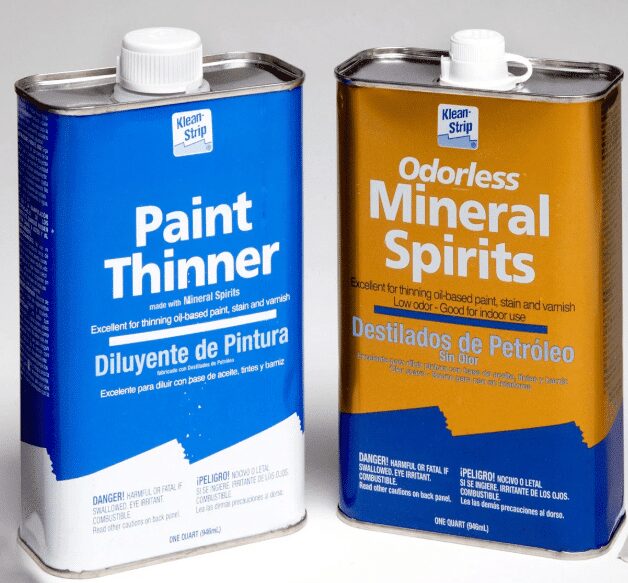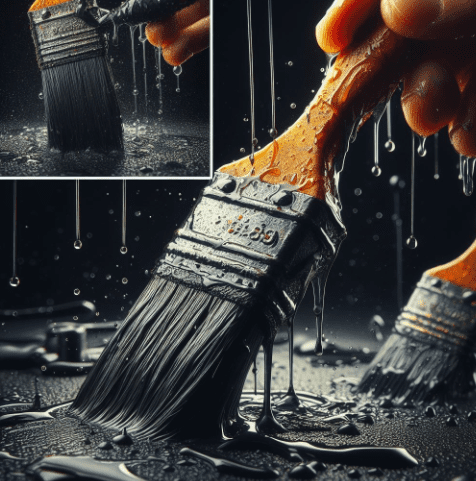
Mineral spirits and thinner are essential solvents for diluting oil-based paint, stains, and varnishes and sanitizing paint tools and oily materials. The use of oil-based paints that require mineral spirits or paint thinner has decreased due to the development and increased use of water-based latex paints in the home.
However, some professional painters and do-it-yourselfers still favor oil-based paint due to its self-leveling and streak-free properties. Additionally, a lot of stains and varnishes continue to be oil-based. Each of these products prohibits the use of water as a solvent.
Do mineral spirits and paint thinner vary in any way? Which of the two should you buy to paint, stain, or clean something?
Comparison Table
| Feature | Mineral Spirits | Paint Thinner |
|---|---|---|
| Composition | Pure petroleum distillates | Petroleum distillates with additives (may include benzene) |
| Odor | Mild | Stronger |
| Cost | More expensive | Less expensive |
| Best Uses | Thinning oil-based paints, cleaning brushes, degreasing surfaces | Same as mineral spirits, good for outdoor projects |
Description of Mineral Spirits
Click Here to Buy Mineral Spirits on Amazon
Paint Thinner: What It Is

Made of mineral spirits, paint thinner is frequently combined with chemicals like trimethylbenzene (benzene). Sometimes, mineral spirits without any additions are used as paint thinner. On the can of some paint thinners, it even says, “produced with mineral spirits.”
Remember that “paint thinner” reflects the product’s function rather than its composition. Therefore, anything that thins paint can be considered a paint thinner. Paint thinners could even include citrus-based compounds or turpentine from pine trees.
Water is called paint thinner because it thins out water-based latex paints. The standard starting point is four ounces of paint thinner per gallon of oil-based paint. You can add more.

Mineral Spirits Vs. Paint Thinner
Paint thinner is a broad phrase that defines the function of the product rather than its composition, whereas mineral spirits is a term that describes the product’s makeup. Both goods come from mineral sources. This separates them from goods like turpentine, made from living pine trees or citrus rinds.
Many people wonder if mineral spirits and paint thinner can be used interchangeably. In most cases, the answer is yes! Both can thin oil-based paints, clean brushes, and degrease surfaces. If you have the option, choose mineral spirits for indoor projects due to their milder odor.
Safety
Mineral spirits and paint thinner are petroleum-based solvents, and proper safety precautions are essential. They emit fumes and are considered flammable. Always work in a well-ventilated area, wear gloves and consider a respirator for extended projects.
Pure mineral spirits and related paint thinners are identical in terms of safety. Both goods are equally dangerous. The Environmental Protection Agency (EPA) of the United States classifies both items as hazardous waste. Benzene can make a person drowsy or possibly put them unconsciously when ingested.
High levels of exposure over a long period could harm your health. For this reason, when using mineral spirits with added benzene, ensure you operate in a properly ventilated space.
Cost Variation, Typical Applications, Uses to Prevent
Typically, mineral spirits are more expensive than paint thinner blends. Typically, the price of pure mineral spirits is 40–50% higher than that of mineral spirits-based paint thinners with additives.
Uses to Prevent
- For paint that has already dried, neither mineral spirits nor paint thinner will work as a paint remover (dry paint must be mechanically removed or stripped away with chemical paint strippers).
- An asphalt driveway or walkway should not be attempted to be cleaned of paint or any other substance. Asphalt will become softer with either product.
- Never clean latex paint from brushes, surfaces with mineral spirits, or paint thinner.
- When used for cleaning or thinning, it could fail to dissolve or separate the pigment from the solvents.
- Never start a fire with mineral spirits or paint thinner for wood, charcoal, or any other type of flame since the toxic fumes could harm your health.
Should You Purchase Paint Thinner or Mineral Spirits?
Mineral spirits and paint thinner can be used interchangeably for most household consumers. Mineral spirits and mineral spirits-based paint thinners serve much the same purposes. Both are non-sticky, transparent solvents that clean thin oil-based paints, stains, and varnishes. Paint thinner is far less expensive than pure mineral spirits.
The 40 to 50 percent price differential for significant commercial projects can be noticeable. However, since these solvents are rarely used, the $4–$5 price difference shouldn’t be substantial for most DIYers and homeowners. Pure mineral spirits are best used inside because they have a milder smell.
FAQ
-
Q: Can I use mineral spirits instead of paint thinner?
- A: Yes! Mineral spirits and paint thinner are often interchangeable for thinning oil-based paints, cleaning brushes, and degreasing. Choose mineral spirits for indoor projects due to their milder odor.
-
Q: Is mineral spirits toxic?
- A: Mineral spirits, like paint thinner, release fumes. It’s essential to work in a well-ventilated area, wear gloves, and consider a respirator for extended projects. Both are considered hazardous waste, so dispose of them properly.
-
Q: Is paint thinner flammable?
- A: Yes, both mineral spirits and paint thinner are flammable. Never use them near open flames or while smoking.
-
Q: What is the difference between mineral spirits and paint thinner?
- A: Mineral spirits are pure petroleum distillates. Paint thinner is a broader term and can include mineral spirits, but it often has additional chemical additives (sometimes benzene) for more robust solvency.
-
Q: Can I use mineral spirits to clean oil paint brushes?
-
A: Yes! Mineral spirits are excellent for cleaning oil-based paint from brushes. Be sure to follow up with soap and water for thorough cleaning and to preserve your brushes.
Conclusion
Now that you understand the similarities and differences between mineral spirits and paint thinner, you can confidently tackle your next oil-based paint project! Whether restoring old furniture, staining your deck, or cleaning up a greasy workspace, choose the proper solvent, stay safe, and finish the job.






















